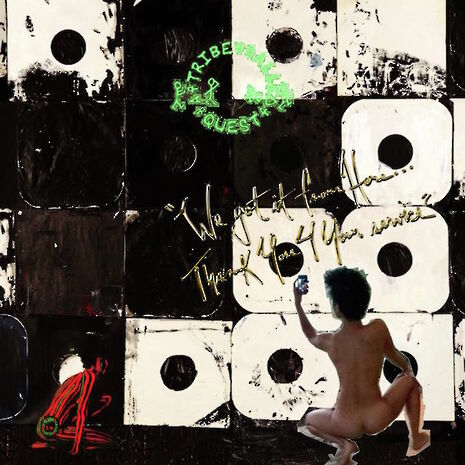Review: A Tribe Called Quest – We Got It From Here… Thank You 4 Your Service

If there are two things I’m sceptical of, it’s calls to the ‘good old days’ of hip hop and comeback albums. Sure, there’s no one quite like Nas in ’92, but there’s no shortage of clever lyricists or talented producers working today. And while it might be interesting to hear groups reunite after decades of silence, the products are often at best throwbacks, and at worst simple cash-grabs. Having said that, A Tribe Called Quest’s We Got It From Here... Thank You 4 Your Service, a comeback album from the good old days of hip hop, is one of the best hip hop albums of the year, a work so full of clever lyricism, political commentary and banging beats that even I’m wishing it was 1992 again.
A Tribe Called Quest is a New York rap-group, originally active in the 80s and 90s, comprised of a colourful trio of rappers, Q-Tip, Phife Dawg and Jarobi White, and the producer Ali Shaheed Muhammad. While their popularity never quite broke out into the mainstream, their influence on hip hop is hard to overstate. On the production side, Tribe was a pioneer in jazz-rap and sampling-technique – lyrically, they pushed hip hop into new abstract and poetic realms with complex rhyme-structures, obscure references and social commentary. The group broke up in 1998, but all four original members are back on We Got It From Here. This is not merely a comeback album – it is a sendoff. Malik Taylor, Phife Dawg, passed away on 22nd March 2016 due to complications relating to diabetes, after having recorded his portion of what was to become a new and final Tribe album.
Lyrically, Tribe focuses on American politics from gentrification to police brutality, proving that they haven’t lost their radical edge. Q-Tip delivers more wordplay and one-liners in one verse than is contained on most albums. Phife Dawg is still absurdly charismatic and sounds like he’s not aged a day. The three bounce off each other like they never broke up. Q-Tip’s fast and abstract lyrics are complimented by Phife’s slower aggressive flow, and Jarobi, who was only rarely featured on old Tribe records, proves that he’s easily able to keep up with some of the best lyrics on the album (“It must be killing season, on the menu Strange Fruit / Whose juices fill the progress of this here very nation / Whose states has grown bitter through justice expiration”). The three members seem fully aware that this is their last project together, and the sheer amount of things, personal and political, that are said during the album’s one-hour runtime is practically overwhelming. I haven’t even had time to digest all the hidden meanings, metaphors and references that some of the denser tracks like ‘Space Program’ or ‘Melatonin’ contain.
The beats, especially ‘Dis Generation’ and the Elton John-sampling ‘Solid Wall of Sound’, are compelling enough to listen to on their own. It takes a while to get used to the boom-bap instrumentation since it is so rarely heard in modern rap, but the rewarding intricacies of the beats come out especially when you focus on the samples. Tribe beats have always been centred around a small selection of carefully collected samples that are then woven into bigger soundscapes. Especially when the art of sampling seems to be dying in hip hop, the production on We Got It From Here sounds like nothing that’s currently out. On top of this, all the features work within the context of the album, even when featured artists like Kendrick Lamar and Anderson Paak were children when Tribe was last around. Even Jack White makes appearances with multiple guitar solos that work surprisingly well within the overall sound.
There’s nothing especially new for Tribe here, but this might just be their most coherently high-quality project since The Low End Theory. And from the lyrics, group chemistry and beats on, it’s clear that no one else could make anything quite like We Got It From Here. While it may be seen as a throwback for those who are used to a different generation of hip hop, the album is a perfect example of the abstract sound that Tribe inhabited. It is certain to excite fans, but it would be a real pity if it didn’t break out to new listeners. This is A Tribe Called Quest’s final album, but I’m hoping it is a sign of things to come. If there is a time for politically conscious and lyric-focused hip hop in the US, it is certainly now
 News / CUP announces funding scheme for under-represented academics19 December 2025
News / CUP announces funding scheme for under-represented academics19 December 2025 News / SU reluctantly registers controversial women’s soc18 December 2025
News / SU reluctantly registers controversial women’s soc18 December 2025 News / Cambridge welcomes UK rejoining the Erasmus scheme20 December 2025
News / Cambridge welcomes UK rejoining the Erasmus scheme20 December 2025 Features / Should I stay or should I go? Cambridge students and alumni reflect on how their memories stay with them15 December 2025
Features / Should I stay or should I go? Cambridge students and alumni reflect on how their memories stay with them15 December 2025 Film & TV / Timothée Chalamet and the era-fication of film marketing21 December 2025
Film & TV / Timothée Chalamet and the era-fication of film marketing21 December 2025









